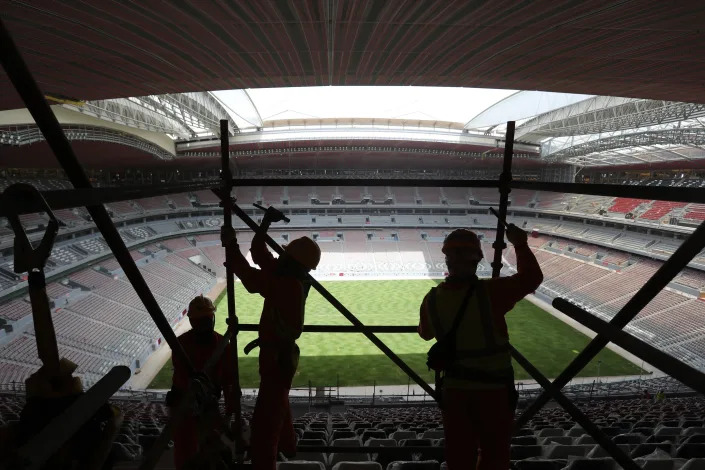
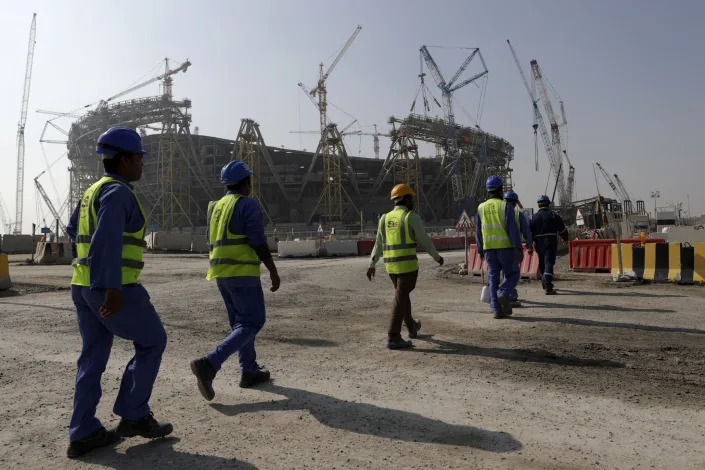
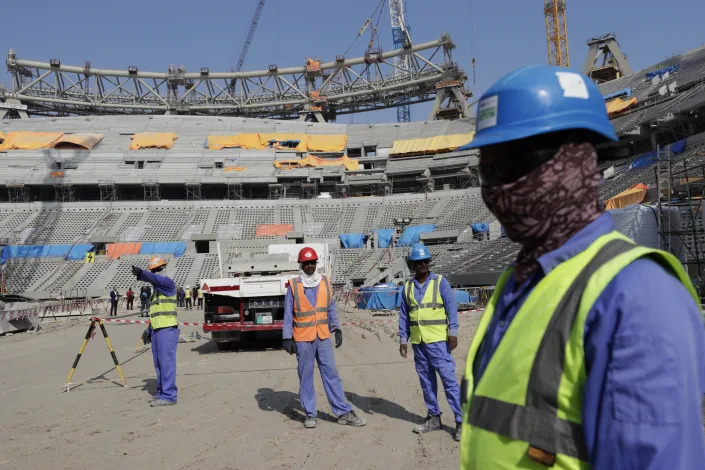
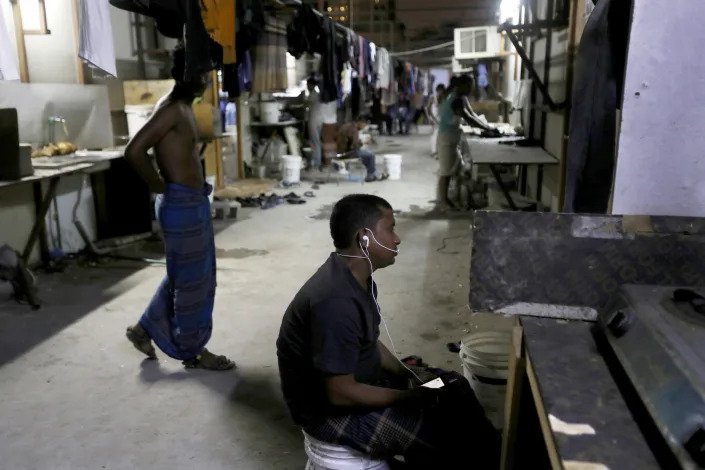
A labourer uses headphones to talk on his mobile phone as the others prepare dinner at their accommodations in the old Musheireb district of Doha, Qatar, Sunday, April 28, 2019. With just days to go before Qatar hosts the World Cup, rights groups fear that a window for addressing the widespread exploitation of foreign workers could soon close. (AP Photo/Kamran Jebreili)More
JOSEPH KRAUSS
Sun, November 6, 2022
With just days to go before Qatar hosts the World Cup, rights groups fear that a window for addressing the widespread exploitation of foreign workers could soon close.
The long run-up to this month's World Cup has brought unprecedented scrutiny to the treatment of the millions of foreign workers in the Gulf Arab nation who built stadiums and other infrastructure, and who will staff hotels and sweep the streets during the world's biggest sporting event.
In the face of heavy international criticism, Qatar has enacted a raft of reforms in recent years, including the partial dismantling of a system that tied workers to their employers and enacting a minimum wage — changes praised by the U.N. as well as rights groups.
But activists say abuses ranging from unpaid wages to harsh working conditions in one of the hottest countries on Earth, are still widespread, and that workers — who are barred from forming unions or striking — have few realistic avenues to pursue justice.
They also worry about what happens after the monthlong tournament ends in December, when the international spotlight moves on and employers slash their payrolls.
Qatar says it leads the region in labor reforms and that progress will continue after the World Cup. Officials from the ruling emir on down have lashed out at critics, accusing them of ignoring the reforms and unfairly singling out the first Arab or Muslim nation to host the Cup.
Qatar, like other Gulf countries, relies on millions of foreign workers, who make up a majority of the population and nearly 95% of the labor force — everyone from highly paid corporate executives to construction workers.
Qatar has dismantled much of what is known as the “kafala” system, which tied workers to their employers and made it virtually impossible for them to quit or change jobs without permission. But rights groups say much of that system survives in different, more informal ways.
Workers often must pay exorbitant recruitment fees, taking on debt even before they arrive. And employers can still cancel visas or report those who quit for “absconding,” a criminal violation.
“If a migrant worker walks away from a job that hasn’t paid them in several months, there’s just a real risk that they’re not going to get that money back," said Michael Page, of the New York-based Human Rights Watch.
Equidem, a London-based labor rights group, recently released a lengthy report documenting abuses in more than a dozen World Cup hotels, where it says workers from Africa and Asia face sexual harassment, discrimination, wage theft and health and safety risks.
Ella Knight, a researcher at London-based Amnesty International, says many migrants working as security guards or domestic helpers go months or even years without a day off, despite laws mandating at least one per week.
“Impunity remains a massive problem, so employers are just not being held to account or not being penalized in a way that prevents abuses from being repeated," she said.
Qatari law bars workers from forming unions or staging protests, and authorities heavily restrict media access to laborers. Police detained at least 60 workers who struck over unpaid wages in August. Last year, two Norwegian reporters were detained while reporting on migrant workers.
Malcolm Bidali, a Kenyan security guard who had anonymously blogged about the plight of workers, was detained for three months — including 28 days in solitary confinement — and fined $6,800 before leaving the country last year.
In an article about his ordeal, he said Qatar's reforms “look splendid” on paper, but that the reality on the ground is different, with authorities seemingly more keen to silence dissent than penalize abusive employers.
“I can’t help but wonder what’s in store for migrant workers after the World Cup,” he wrote. “If workers still live in horrible conditions, if workers still go months without pay, if workers still can’t freely change jobs, if domestic workers still can’t get justice, what happens when no one’s looking?”
Qatar has defended its reforms and says it will continue to safeguard workers' welfare after the World Cup.
“Qatar has always acknowledged that work remains to be done, notably to hold unscrupulous employers to account — as is the case with any country around the world,” Ali Al-Ansari, Qatar's media attache in the United States, said in a statement. “We are already seeing the number of offences declining year-on-year as compliance increases among employers.”
Labor rights activists say Qatar still owes compensation to those who worked on World Cup infrastructure projects going back to the awarding of the tournament in 2010 — years before the reforms were enacted. Amnesty says authorities failed to investigate the deaths of workers during that period.
Amnesty and other rights groups now urge soccer's governing body FIFA to establish a $440 million fund — equivalent to the tournament's total prize money — to compensate workers, an appeal that several federations support. The global soccer body has said it is open to the idea.
Qatar established its own fund in 2018 to compensate workers who are injured on the job or who are not paid, which Al-Ansari said had paid out some $270 million this calendar year alone. He did not comment directly on the calls for a larger remedy fund.
Page, of Human Rights Watch, says the sizable payouts by Qatari authorities, which only cover claims in recent years, show the importance of establishing a larger fund to address the “very serious abuses” that took place in the several years before the reforms were enacted.
“If this is their stance now, in the heat of the spotlight, what is their position going to be — the Qatari authorities — after the World Cup, in terms of reforms and migrant worker protections, when the spotlight is off them? I think that’s really concerning,” he said.
___
AP World Cup coverage: https://apnews.com/hub/world-cup and https://twitter.com/AP_Sports
___
Follow Joseph Krauss on Twitter at www.twitter.com/josephkrauss
French building group summoned over Qatar working conditions
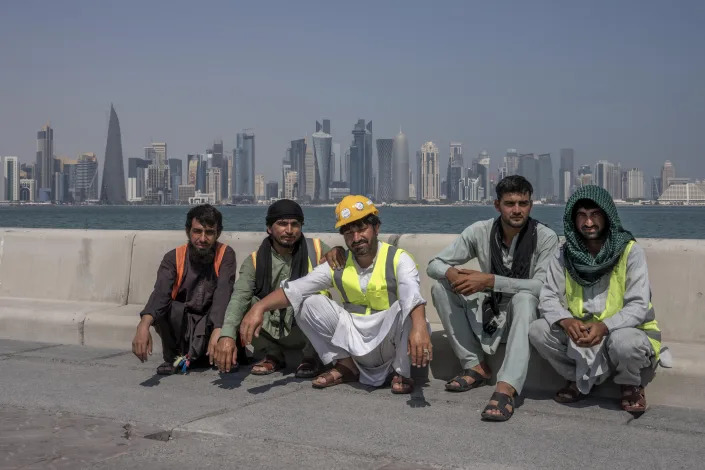
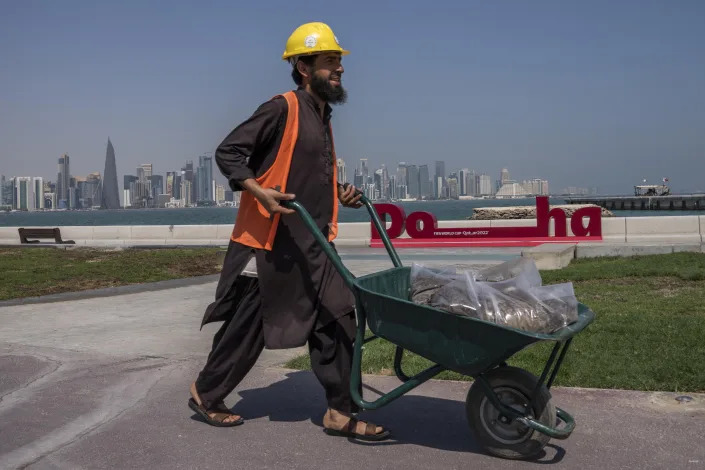
WCup Qatar Laborers
NOT WEARING STEEL TOED BOOTS!!!
A Pakistani migrant laborer works on the corniche, overlooking the skyline of Doha, Qatar, Wednesday, Oct. 19, 2022. One of the world’s biggest sporting events has thrown an uncomfortable spotlight on Qatar’s labor system, which links workers’ visas to employers and keeps wages low for workers toiling in difficult conditions.
(AP Photo/Nariman El-Mofty)More
SAMUEL PETREQUIN
Mon, November 7, 2022
French construction company Vinci said on Monday that one of its subsidiaries has been summoned by an investigating judge to answer charges that it did not respect the rights of migrant workers who were hired to build infrastructure for the World Cup in Qatar.
The charges relate to a complaint dating back to 2015 that was filed by French advocacy group Sherpa against Vinci Construction Grands Projets and the French executives of its Qatari subsidiary, including accusations of using “forced labor."
The Nanterre prosecutor had closed the case without further action in 2018, but Sherpa, which was joined by several former workers, filed a new complaint that led to the opening of a judicial investigation.
Qatar has faced intense scrutiny ahead of the tournament for its labor laws and treatment of hundreds of thousands of migrant workers, mostly from India, Bangladesh, Pakistan, Sri Lanka, Nepal and other South Asian countries.
Sherpa said it collected testimonies about the working conditions at some of the construction sites operated by Vinci’s subsidiary, which included working in temperatures over 45 C (113 F) with insufficient water, the withholding of passports, and lack of access to showers in accommodations.
Vinci has denied any wrongdoing and said Monday that none of the projects awarded to its Qatari unit QDVC has any connection to the World Cup in Qatar starting later this month.
“In fact, these projects were entrusted to QDVC before the competition was awarded to Qatar and mainly relate to transport infrastructures," Vinci said, adding that it did not sign any contract with the World Cup organizing committee to build any stadium or hotel in Qatar.
The construction group has, however, worked on some of the infrastructure that will be used during the World Cup, including the Doha metro connecting the airport with the historic city center, and the Lusail light-rail transit system transportation network.
Vinci said it is committed to “improve the living and working conditions of all workers at its construction sites, all around the world."
The group added that “respect for human rights and health and safety at work have been a priority for its staff since QDVC was formed in 2007."
The hearing by the Nanterre investigating judge has been set for Wednesday. Vinci complained about its timing, saying that facing charges just before the start of the World Cup amid huge media attention “might be rather unfavorable in terms of a dispassionate consideration of the facts."
Since FIFA awarded the tournament to Qatar in 2010, the country has taken some steps to overhaul the country’s employment practices. However, Human Rights Watch has urged Qatar to improve compensation for migrant workers who suffered injury, death and wage theft while working on World Cup-related projects.
___
AP World Cup coverage: https://apnews.com/hub/world-cup and https://twitter.com/AP_Sports
SAMUEL PETREQUIN
Mon, November 7, 2022
French construction company Vinci said on Monday that one of its subsidiaries has been summoned by an investigating judge to answer charges that it did not respect the rights of migrant workers who were hired to build infrastructure for the World Cup in Qatar.
The charges relate to a complaint dating back to 2015 that was filed by French advocacy group Sherpa against Vinci Construction Grands Projets and the French executives of its Qatari subsidiary, including accusations of using “forced labor."
The Nanterre prosecutor had closed the case without further action in 2018, but Sherpa, which was joined by several former workers, filed a new complaint that led to the opening of a judicial investigation.
Qatar has faced intense scrutiny ahead of the tournament for its labor laws and treatment of hundreds of thousands of migrant workers, mostly from India, Bangladesh, Pakistan, Sri Lanka, Nepal and other South Asian countries.
Sherpa said it collected testimonies about the working conditions at some of the construction sites operated by Vinci’s subsidiary, which included working in temperatures over 45 C (113 F) with insufficient water, the withholding of passports, and lack of access to showers in accommodations.
Vinci has denied any wrongdoing and said Monday that none of the projects awarded to its Qatari unit QDVC has any connection to the World Cup in Qatar starting later this month.
“In fact, these projects were entrusted to QDVC before the competition was awarded to Qatar and mainly relate to transport infrastructures," Vinci said, adding that it did not sign any contract with the World Cup organizing committee to build any stadium or hotel in Qatar.
The construction group has, however, worked on some of the infrastructure that will be used during the World Cup, including the Doha metro connecting the airport with the historic city center, and the Lusail light-rail transit system transportation network.
Vinci said it is committed to “improve the living and working conditions of all workers at its construction sites, all around the world."
The group added that “respect for human rights and health and safety at work have been a priority for its staff since QDVC was formed in 2007."
The hearing by the Nanterre investigating judge has been set for Wednesday. Vinci complained about its timing, saying that facing charges just before the start of the World Cup amid huge media attention “might be rather unfavorable in terms of a dispassionate consideration of the facts."
Since FIFA awarded the tournament to Qatar in 2010, the country has taken some steps to overhaul the country’s employment practices. However, Human Rights Watch has urged Qatar to improve compensation for migrant workers who suffered injury, death and wage theft while working on World Cup-related projects.
___
AP World Cup coverage: https://apnews.com/hub/world-cup and https://twitter.com/AP_Sports
No comments:
Post a Comment